-
LOVER'S POINT (Steve McQueen 2020)
STEVE MCQUEEN: LOVER'S ROCK (2020)
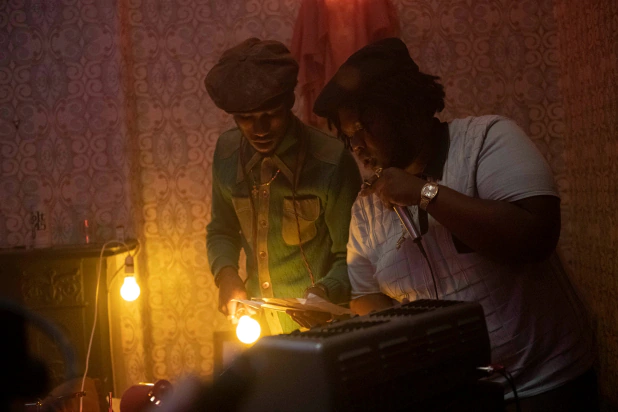
A celebration staged - then watched
Lovers Rock, the opening night film of the 58th New York Film Festival, is an hour-plus television series episode that is part of McQueen's five-part "Small Axe" anthology that premieres on BBC One later this year and in the US on Amazon Prime.
Lovers Rock is nearly zero as a story - boy meets girl, they dance all night, take dawn bike ride, girl sneaks into house in time to go to church - but as a staged event it is enormous, a West Indian soul-reggae house party dance night that Peter Bradshaw, who gives it five out of five stars in a Guardian review, calls "the best party ever." He accurately says "everything and nothing" happens and notes most of this 68-minute film, co-scripted by McQueen with writer-musician Courttia Newland, designed by Helen Scott and (mainly?) shot by Shabier Kirchner, would be a five-minute sequence in a regular film. Dennis Lim, the Film at Lincoln Center Program Director, in a Zoom-style interview with McQueen, suggests this is more like one of the short art films he made before he got started on features, the chronicling of a process-event. I came to scoff (not a fan of McQueen coming into it), but I became a convert. This is a rich, lush, enveloping event. It's alive. It's young sexy blackness as you've never seen it caught on film.
But Bradshaw is also right in calling it a "novella," because it has characters and mini-backstories to burn ("everything") - only they're brief and sketchy ("nothing"). McQueen told Lim this remarkably rich "staged" event was (became) a real party; it would have happened (gone on, and on and on) whether the camera was there or not; he felt "invited," and (he said this two or three times) "it was euphoric." In a way all but Michael Ward and Franklyn and Amarah-Jae St Augin as Martha, the couple the camera follows out into the night-into-morning at the end, are extras. but they are extras who are stars in their own right, starring in their own movie, living their own party, and they give their all. McQueen just had to "know when to step back" - and watch and let it happen. Self-indulgent? Yes, but no, because he frames it so beautifully.
The time is 1980. The setting is set in Ladbroke Grove, west London, over a single evening at a house party in 1980. The people are mostly West Indian first or second generation men and women. Blacks weren't really welcome at London dance clubs, which had quotas for them, and so they made their own so-it-yourself clubs, for themselves. They took a living room, filled it with a humongous set of speakers, and charged a 50p entry fee at the door, extra for food and drink from the kitchen. Men dressed up in tight bell bottoms and fancy dress jackets with eventful hats; women wore fancy, slinky dresses they or their own had made for them. McQueen, who calls this a "blues party," is drawing on the experience of his own parents here, and a female relative whose father left the door open so she could sneak back in after a dance party in the morning, just as Martha (St Aubin) does here, to deceive her religious mother and go to church with her Sunday morning. All this is there, starting with the dragging in of the speakers and setting up of the table to play the vinyl, and dragging of the sofas into the back yard for private, more romantic interludes by couples during the night.
The music is enveloping. The atmosphere is sexy, and sexier as the night wears on. The music is lover’s rock, soul and reggae. Lovers rock is a thing, a "largely underground phenomenon," London black reggae emphasizing women's feelings, a genre that went global, a Guardian article Bradshaw references explains, but went largely unrecognized at home and faded away.
I don't know how period-authentic all the gestures are, but McQueen says they avoid gestures that aren't. One is the way the men grab the women's elbow, then slide it down to their hand, asking for a dance. Did men drink bottled beer while dancing? I guess they did. They light a lot of nice long thin spliffs, and the women smoke cigarettes, innocent highs. It seemed like some of the men were very predatory, but it's interesting how they cloak it in an air of chivalry and flowery compliments. Martha comes in with her friend Patty (Shaniqua Okwok), who disappears early on. Martha runs out after her but can't find her, and, with a group of whit men aproaching her, quickly withdraws back into the party room. Apparently Patty is miffed that Franklyn has settled on Martha and not her. Or she didn't get the man she longed for.
At one point there's a moment in a bedroom with two women sitting on a bed kissing.
A remarkable and lovely moment comes - though in conventional terms, like everything else, it goes on too long, when the music stops and the entire crowd sings the Janet Kay song "Silly Games," a cappella. It's the kind of thing you'd absolutely insist had to be staged, and it apparently wasn't. McQueen says this just happened, he had nothing do do with it. It's climactic, but there's much, much more. Remember in Aleksandr Sokurov's Russian Ark part of the show-offy single take is the ballroom full of elegant costumed dancers with the Mariinsky Orchestra with Valery Gergiev conducting, and at the end the camera comes back to them, and they're still dancing? You imagine those dancers, dancing hour after hour for the camera. This is like that, only the dancers are having a hell of a good time. And at the end the music gets faster, and they get crazy, and the screen is full of figures jumping and jiving, leaping and down on the floor waggling their arms and legs.
Before she goes home Franklyn takes Martha to the garage where he works, to make out, to entertainher in privacy. But his young white boss comes in, all unexpected, because it's Sunday morning, and chews him out and says, "You don't bring your Doris here!" At this point, Franklyn drops his Jamaican lilt he's bee speaking in all night and talks to the young white guy in more "multicultural London," a bland of cockney. Was the Jamaican a fake? No, it was probably his first language. This is only a hint of the depth and richness of this remarkable film's cultural and social detail. As I said I cam to scoff, and I admit I did feel bored in the middle of it, feeling it was going on much, much too long, which it does by normal standards. But I was swept away in the deep soul vibe and, the warm eroticism, and the fantastic go-for-broke in-character lived performances of the ensemble. As an opening night film, in a real not virtual NYFF, this would have worked unusually well. It's engaging, energetic, upbeat, and unique. How great it would have been on the Walter Reade Theater's great sound system and big screen.
Lovers Rock, 68 mins., episode of McQueen's five-part "Small Axe" anthology series for BBC (two othes also included in the NYFF) watched in virtual form as part of the New York Film Festival, for which it was the Opening Night film.
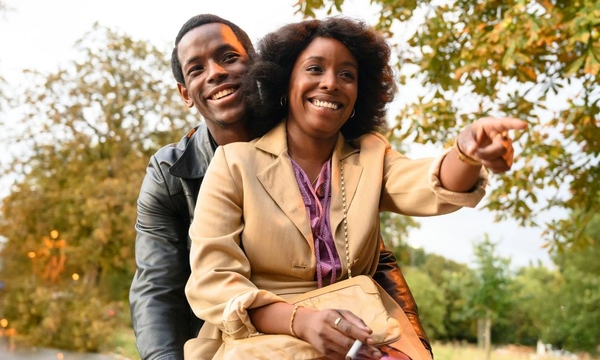
MICHAEL WARD AND AMARAH-JAE ST AUBYN IIN LOVERS ROCK
Last edited by Chris Knipp; 09-18-2020 at 12:09 AM.
-
Malmkrog (Cristi Puiu 2020)
CRISTI PUIU: MALMKROG (2020)
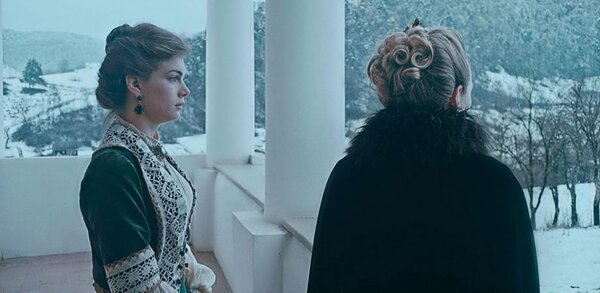
MARINA PALLI AND DIANA SAKALAUSKAITÉ in MALMKROG
Idle rich with a lot to talk about, c. 1900
I reviewed Cristi Puiu's The Death of Mr. Laaarescu as part of the 43rd New York Film Festival in 2005. It was my first press screening at my first NYFF. It's also credited with spearheading a "Romanian New Wave." Malmkrog is named for a luxurious estate in Transylvania where the action, if we can call it that, transpires. Five Russian aristocrats in 1900, speaking to each other in stilted French as was their custom, talk from before lunch till after dinner about a variety of general subjects drawn from a book by the Russian 19th-century philosopher Vladimir Solovyov called Three Conversations. A 1915 English version is headed "War and Christianity from the Russian Point of view." It all goes to show the idleness of Russian aristocrats as seen by a latter-day Romanian, and mind-sets in which liberalism is a mask for colonialism and racism. It is largely a sterile exercise, more stagnant pond than New Wave, but the beautiful staging and disciplined acting are wonders to behold.
Stilted French - that is a determining factor. This doesn't have the quality of speech. There are two men - one man, a general, having left early - and three women. Besides war, the place of Russia in Europe and the world is another topic, and the existence of evil in the world a third big one. There are some characteristics attached to the speakers. For instance, it's the general's wife, Ingrida (Diana Sakalauskaité), who defends war. The letter she reads about her husband's satisfaction at killing a horde of Ottoman Bashi-bazouk soldiers as punishment for their hideous massacre of a town full of Armenians is one of the film's more memorable moments. The "Franco-Russian" Edouard (Ugo Broussot, a theatrically-trained French actor), understood to be a prosperous businessman, expounds at length (several prominent reviews, Jonathan Romney's for Screen Daily and Boyd van Hoeij's for Hollywood Reporter, refer to it as "mansplaining") on Russia's role as a "European" civilizer of the world, in a way that incorporates Solovyov's racist attitude to the "yellow-faced" Chinese. Two other women, Madeleine (Agathe Bosch), a dryly intellectual middle-aged woman and Olga (Marina Palii), young and condescended to but presumably Nikolai's wife, complete the endlessly chattering group. The actors' discipline and stamina are world-class.
Why is all this relevant, and what makes three hours and twenty minutes of stilted philosophical debate material for a film? The answer isn't evident, and this is a step backward, or further backward, from the lively, humane Cristi Puiu who made Mr. Lazarescu. This is more a test for film buffs and particularly festival-goers who pride themselves on their stamina and Olympic-level attention spans. It's like sitting through a Wagner opera if you're not a Wagner fan, but without the beautiful music. One reviewer recommended coffee "or something stronger."
There are moments of hints of excitement. We see in his own shortest of the five chapters headed "István," headed for the butler, who directs a team of nearly silent and diligent servants the outwardly "liberal" five conversationalists studiously ignore, that he hits a kitchen employee guilty of making bad - or could it be lightly poisoned? - tea. Later, there's a disturbance and loud music heard and the bell of the host Nikolai (Frédéric Schulz-Richard) is not answered. Then there is a wild chase of figures from the kitchen and explosions, with the five dropping to the floor. I thought revolution had come, and they had died. But we see them in the distance later out in front of the estate, mysteriously congregating. Maybe it was only firecrackers - after all, this was Christmas Eve. The sounds in the background, perhaps including a music lesson for a child, and the work of the servants, including the bathing and dressing and bedding of a member of the group who is unwell, show Puiu's meticulous attention to every detail, including of course furnishings and costumes. But one detail that has eluded him: making this action interesting or relevant to us.
"A pristine, sometimes terrifying vision, of the shimmering violence beneath the colonialist's veneer of politesse" says a current NYFF tag for this film. Nice one. But you can't sell this dry summary of a dated book that facilely.
Malmkrog, 200mins., debuted at the Berlinale FEb. 2020; Belgrade, Vilnius (internet), Cluj, and was screened online for this review as part of the New York Film Festival (Sept. 17-Oct. 11), hybrid with virtual and drive-in screenings.
Last edited by Chris Knipp; 08-28-2021 at 06:19 PM.
-
GUNDA (Victor Kossakovsky 2020)
VICTOR KOSSAKOVSKY: GUNDA (2020

GUNDA WITH PIGLET IN GUNDA
In a pig's eye
What is the average life span of a pig? Well, that's just one of the many questions that Gunda, a non-fiction film focused on a large sow that's just given birth, will not answer for you. I confess myself resistant sometimes to the purely observational approach to documentaries, in dealing with subject matter where I'm ignorant of and could use some instruction. I am not a barnyard person. One of my thoughts while watching Gunda was though we get to hear the (enhanced) sounds, we don't have to smell the smells. I was grateful documentary Smell-o-Vision has not come, however John Waters might delight in the thought.
There is evidently a runt of the litter - isn't there always? But while the camera seemed to follow this less energetic, more tentative piglet, it was never clear what was going to happen to it, if the eponymous large sow would be helping it, or just testing it. Earlier on, she appeared to sit on a weakling. Here an explanation would have been welcome.
Of course, if there were explanations, this would not be the festival-ready art film it is, with its brilliant, contrasty black and white images, and its impressively austere aesthetic, it's willingness to take long pauses, when we're waiting for the piglets to come out of the hutch occupied by their mom, or for the free range chickens in another location edited in between the pig sequences, whose movements onto grassy surfaces are a marvel of tentativeness. For a bit, the film seems to have become a highly specialized closeup portrait of how chickens plant their - what do you call them? paws, claws, feet on the ground. And then comes the promised sight of the one-legged chicken. Yes, and a fascinating show of coping under adversity it is. And then the camera, as restless as the growing piglets, who grow jumpier and pushier in each successive sequence, moves on. What is the fate of the one-legged chicken? Did it live happily ever after? Another unanswered question.
But this illustrates that this film - which also cheats in shooting not just on Gunda's farm in Norway, but also on ones in Spain and Britain, and making them blend together - isn't simply observational, like, for example one of my longtime favorites and models of such filmmaking, Philibert's To Be and to Have. Because Kossakovsky, known for the "visionary" quality of his films, and their "simplicity," has chosen dramatic moments - a very large sow with a new brood; a chicken with one leg. Because observing these farm animals in their ordinary daily rounds would be pretty unexciting, unless presented in an informational documentary, filmed over a long period, with narration based on lengthy informed observation and expertise. Some things don't necessarily cry out to be made into an art film.
Nonetheless for many viewers no doubt Gunda does perform an important function. It takes you into an at least apparently unmediated view of the world of pigs and chicks, and cattle too (they like to stare at you, and use each other's tails as fly-whisks, while pigs get away from bugs by wallowing in mud). Away from the music and the narration, viewers may look harder, feel closer, and learn to form their own opinions. They will be uninformed opinions, but they won't be crafted by artificial anthropomorphic storylines. Of course we are grateful for a film that's so keenly observed and beautiful, and for the lack of a narration that might have been tasteless or corny. And needless to say, I was glad to have no dialogue after the tedious yakfest that was Crisi Puiu's Malmkrog, seen and reviewed here last night.
No dialogue is necessary for the stunning finale, when Gunda suddenly has her whole brood taken away, and the last ten minutes are her looking for them, and I guess going through the first stage of Kübler-Ross's five stages of grief. Executive-produced by now famous vegan Joaquin Phoenix, this brilliantly made film is a strong statement of the stark inequality of the place of humans in the natural world.
Gunda,93 mins., debuted at the Berlinale Feb. 2020, released theatrically in Norway Aug. 2020, and was part of the Main Slate of the New York Film Festival (Sept. 17-Oct. 11, showing Sept. 19, screened virtually as part of the NYFF for this review. A Neon release. Slated for Crested Butte and Hamptons showings in October.
Last edited by Chris Knipp; 06-13-2021 at 05:16 PM.
-
THE CALMING 平静 (Song Fang 2020)
SONG FANG: THE CALMING 平静 (2020)
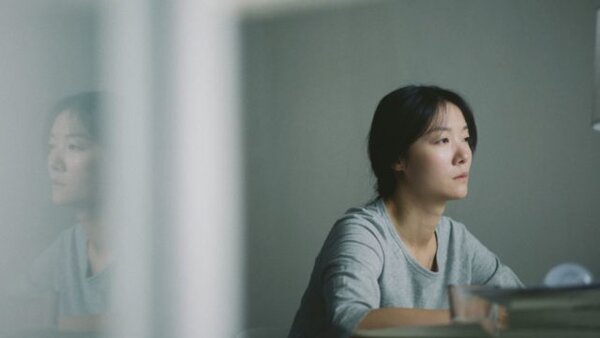
QI XI IN THE CALMING
Where life, though joyless, still is calm
I reviewed Son Fang's first film, Memories Look at Me, as part of the 2012 NYFF.
This one, about movie lady Lin Tong (Qi Xi), a documentary filmmaker who's broken up with her boyfriend Guiren, is itself in a sense becalmed. Call it meditative, observational, or, to be more trendy, slow cinema. In Japan for movie business, Lin only tells one Japanese guy what's happened. In Tokyo her hotel view at night is gorgeous. She goes to Niigata to see snow, staying in hotels, taking public transportation, alone. She looks at things. We get the point: she's lonely, perhaps shut down. Back in China, she moves into a new apartment. Visiting with her parents, her father, a doctor, is very ill now. They don't know. She doesn't tell them. She gives him congee. That's not much for forty minutes, but it's a kind of warmup, warmup for contemplation. I started to miss the pigs in Gunda. They're so enthusiastic! Even if they only grunt or oink. But of course it's just a question of tuning in. The Letterboxd responses are very happy and approving.
When Lin meets up with her good friend in Hong Kong, the energy level rises. She has a nice caucasian husband who speaks Chinese, which one rarely sees in a film. Asked about Guiren, she says things are as usual, but "Let's change the subject." Gradually one realizes Lin is not so much sad as learning to live alone. But as a kind of artist, she is used to that state. I remembered T.S. Eliot's The Cocktain Party, how Peter and Celia bond because they discover both like to "go to concerts alone, and to look at pictures." It's nice to experience certain things, like music and pictures, even wild nature, alone, but nicer if one can do that by choice, if one has a partner.
Lin is reminded she hasn't one. There's the nice husband, and another man who's just getting married, and the old couple observed walking, still in good health and still walking hand in hand. And Lin's own parents, but with the hint of loss in her good friend's grandmother's recent peaceful passing in her sleep.
To see how Lin is learning to experience things alone and to be, perforce, alone, we often see her against the window of a single hotel room, or on a train, or a boat ride, with the scenery behind her and no one nearby. Or lovely foliage, with no one else around. Every time the shot is beautifully composed, and that expresses calm. Aesthetics are a discipline that calms. "After great pain a formal feeling comes."
After many beautiful scenes experienced by Lin alone, she has pain, and spends time, unexplained, in a hospital. Then she attends a concert playing Handel's "Alexander Balus" oratorio, and hears the beautiful aria containing the lines, "Where life, though joyless, still is calm,/And sweet content is sorrow's balm." Life, though joyless, still is calm. That sums it up. "Sublime, don't you think?" as asks the Chevalier Danceny (Keanu Reeves) in Stephen Frears' Dangerous Liaisons, after music like this. A tear drips down from Lin's eye as she listens, as it should.
The Calming is very beautiful, and calm, so beautiful and calm it's not quite real and can't quite breathe. But it can provide great satisfaction to some viewers. If one had a copy, one could take a hit off it at almost any point, and zone out.
The Calming 平静 ("Calm"), 92 mins., debuted at the Berlinale Feb. 2020, and showed at the NYFF virtual festival Sept. 19. Screened online for this review as part of the New York Film Festival (Sept. 17- Oct. 11, 2020).
Last edited by Chris Knipp; 10-11-2020 at 08:55 AM.
-
TIME (Garrett Bradley 2020)
GARRETT BRADLEY: TIME (2020)

A woman waits eighteen years for her husband to get out of prison
Time by documentarian Garrett Bradley is an amalgam. Focused on a black mother whose husband is in prison for nearly twenty years and her six sons, it blends a mixture of film footage. The most plangent and vivid, sometimes clumsy, is home footage shot by the mother herself of the boys for her husband. The rest was made by the filmmaker's cameramen of the family. The whole is joined together by conversion of all to black and white. The period footage is purposely jumbled up in time, to be not just documentation but the haunting of memory. The result is perhaps intentionally disorienting - a "vibrant cubist portrait," as Shri Linden puts it in her Hollywood Reporter review.
Sibyl Fox Richardson, known as Fox Rich, the center of the film, is the wife of Rob Richardson, sentenced to sixty years in Louisiana State Prison for a failed bank robbery. It was an act done out of "desperation," Fox Rich says. They and another were trying to start a hip hop clothing store, in Shreveport but an investor pulled out, and they were poor. Fox Rich was involved in the crime too, as the driver. She agreed to plea bargain and wound up doing 3 1/2 years. Rob wouldn't, and he got the big sentence.
The point of the jumping around is what? To make us feel the same powerlessness, perhaps, as Fox Rich and enter into her memories. The whole point is her struggle, her pain, and her determination, as she raises the boys, with help from her mother, into what looks like an impressive, good-looking brood. Fox Rich is a powerful, steadfast, determined woman, who we see often as an inspirational speaker in her self-defined cause talking to wives and families of prisoners about how incarceration of black people in America is slavery, and she is an abolitionist. At some times we see she has a car dealership, and recording a filmed advertisement, presumably for television. This is Fox Rich's portrait and that of her six sons, especially the twins, Freedom and Justus, born after Rob was imprisoned because she was pregnant when he went in.
The time-mix makes a dizzying continuum of the near twenty-year wait, reduced to only two visits to her husband a month, and the thousands wasted on lawyers who come up with nothing, while the boys go from chirping kindergarteners, junior high schoolers and high schoolers to college kids, and back again, and Fox Rich waits and controls her anger and pain as year after year she calls the white judge's office to find out what his response is to the latest appeal of the sentence.
As is often the case, I appreciate the artistry of this film, and above all the immediacy of its vivid personal portraiture, while still wishing it had at least sometimes been also framed in a more conventionally explicit form or included more conventionally explanatory material, more facts. But there are many strong moments here. Fox Rich is eloquent, and fascinating. All the different hair styles! The dignity, and the passion! Filmed by Bradley, Justus, a very handsome 18-year-old, perhaps, says, in crisp tones, "When my mother and father were arrested for robbing a bank" (with a confident click on the "k" of "bank"), "she wound up having a set of twins, one being myself, the other being my twin brother Freedom." He also says, "My family has a very strong image." (Here we see them assembled, adult, well dressed, at a public occasion.) "But behind that is a lot of hurt, lot of pain." And this film is a stirring portrait of that pain.
What stands out is Fox Rich's apparently unwavering loyalty to her husband, and to the cause of making a decent living and raising her sons right, in the racist South. Eighteen years for a minor bank robbery, a sentence of sixty? I guess they didn't have access to the right fancy lawyers. I guess they were Black in America.
The score is unusual, like the chronology, periods of conventional string music augmented by a tranquil piano performance by a now ninety-something Ethiopian nun called Emahoy Tsegué Guèbrou, found on YouTube.
Greg Nussen wrote eloquently of this film on Letterboxd: "Time is both a cinematic wonder and a heavy piece of political agitation. . . [it's] as much about the arbitrary nature of time as it is about the fallacy that forms the basis of the American justice system. Time that is 'served' and time that is taken away, time that is thrust upon victims of the system and time that is even gained. Prisons are neither places for rehabilitation nor a useful means with which to punish someone, they accomplish nothing of value except for the people that literally profit off it."
"Are we going to see him get out?" I think we wonder as we watch. Yes, we do, and it's worth the wait. Rob comes out in a T-shirt saying "NEVER GIVE UP." The return is joyous, sexy, and loving. Rob is not a cowed victim. He is presidential. At a celebration of many hugs he says the greatest value and the greatest faith is love and adds, "If it could be an acronym it would be Life's Only Valid Expression." These people have a lot of class. They're pretty awesome.
Time, 81 mins., debuted at Sundance Jan. 2020, and won the Documentary Directing award at Sundance and has won several other awards and nominations. It also showed at Miami Mar. 2020 and Sept. 20 at the virtual New York Film Festival, as part of which it was screened for this review, and is set for showing Sept. 24 at Zurich, Camden International (virtual) Film Festival, London and the Hamptons (virtual) Oct. 9. It is slated for internet release on Oct. 16 in the US and Oct. 23 in Canada.
Last edited by Chris Knipp; 12-14-2023 at 10:08 PM.
-
NIGHT OF THE KINGS/LA NUIT DES ROIS (Philippe Lacôte 2020)
PHILIPPE LACOTE: NIGHT OF THE KINGS/LA NUIT DES ROIS (2020)
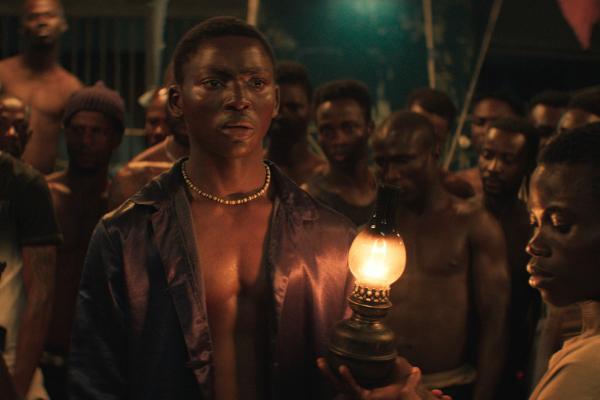
KONÉ BAKARY IN NIGHT OF THE KINGS
Night of the red moon
Night of the Kings/La Nuit des rois is a celebration set in Côte d'Ivoire and primarily in French, of improvisation, storytelling, and dramatic staging that also touches on the politics of control and the precariousness of life. Sometimes the narrative line may seem too much interrupted, but this is itself brilliant storytelling that impresses with its verve and flair and announces the arrival of a bold new talent from Africa. The setting is MACA, an overcrowded, disorderly prison in Abjijan, Cote d'Ivoire, in the middle of a jungle-park. "La MACA is the only prison in the world run by an inmate," someone declares. He is called Barbe Noire (Black Beard: Steve Teintchieu), and he is sick, and his authority is faltering. One called Demi Fou (Half Crazy: Digbeu Jean Cyrille) is a pretender for the throne. But he must contend with Lass (Abdoul Kariyi Konajé). The opening scene follows a new inmate as he arrives, riding rather grandly alone, in a yellow shirt, in the back of an open truck (Koné Bakary: but don't look him up: you'll find only Bakary Koné, a Cote d'Ivoirean footballer). He looks young and a little delicate, feminine (with a necklace), and yet also proud and strong. (The prison contains a truly effeminate young man, a cross dresser who's moved around, but never does anything). The prison throbs with energy. Guards or managers seem to stay in a room by themselves observing from a distance.
As soon as Barbe Noire sees the new arrival he impulsively decides to name him "Roman," a designated storyteller. This will distract the attention of the prisoners and prolong Barbe Noir's authority a little. What the new Roman doesn't know is that the Scheherazade-like tradition calls for him to tell stories for one night, a night of the red moon, and then he will be killed. Later Roman sees the iron hook at the top of the stairs and meets a strange old white man with a big bird on his shoulder (legendary French actor of Beau Travail and Holy Motors Denis Lavant) who tells him what his fate will be. Barbe Noire does not last the night, but Roman does.
There are only a few named characters, but this is very much an ensemble piece with a hundred extras who provide a surging energy. When Roman begins his storytelling, clad now in a handsome long blue silk shirt and standing on a box, there emerges a small company of self-appointed singers, mimes, and dancers around him who will act out, underline, and in the oral tradition, delay key moments of his tale.
How will Roman even survive a minute? He seems timid at first arrival, almost speechless. But when he speaks, scoffers are soon silenced. He announces he is a pickpocket, scoundrel, shyster - and common thief (cheers). He tells that he had an aunt who was a griot (oral bard), and he launches into a criminal epic close to his own experience - the life of Zama King - they know who he is - his own childhood friend, now a legendary crime boss, just arrested, head of the notorious e "Microbes" gang who rode in on an insurrection.
Roman weaves in legendary elements such as a king and queen (artist/hair sculptress Laetitia Ky) arriving long ago and a blind father for Zama, Soni (Rasmané Quédraogo). Bakary Koné holds his own as a dramatic speaker, but there's the chorus at hand, and scenes illustrating his tale, notably the king and queen arriving along the seashore, almost TV-footage of civil unrest, and Zama marching through a crowd with Roman on the periphery. Meanwhile time out for a quick feast, and for Barbe Noire to collapse and give up - making Roman's story just the framework for Lacote's effort to tell three stories, that of Roman, i.e. Zama King; of Barbe Noire; and the story of his own effort to weave things together into a very theatrical whole. As storytelling, no one of the three is totally convincing. But as cinema, this is a rich and tasty dish, deftly and economically weaving together many essential elements of an African life and culture shown to be still flourishing amid poverty, confinement, civil unrest and political upheaval. Roman nods to City of God, and a review for the Toronto Globe and Mail calls it "City of God crossed with A Prophet by way of One Thousand and One Nights." Indeed the final shot may link Koné Bakary's Roman with Tahar Rahim's Malik El Djebena in Jacque Audiard's prison epic. High ambitions; great models.
Night of the Kings/La Nuit des rois, debuted at Venice Sept. 2020, also included at Toronto and the New York Film Festival virtual edition, as part of which it was reviewed Thurs., Sept. 24, 2020 for this review. Coming to Chicago and Reykjavik in October. Metascore 82% (so many mainstream reviews).
Last edited by Chris Knipp; 09-25-2020 at 12:28 AM.
-
CITY HALL (Frederick Wiseman 2020)
FREDERICK WISEMAN: CITY HALL (2020)

MAYOR OF BOSTON MARTY WALSH IN CITY HALL
Guy Lodge's Variety review lead off, "Frederick Wiseman’s Mammoth Boston Doc Shows Anti-Trump Politics in Practice."
The people who work for the city work for you"
"...My view is that these films are biased, prejudiced, condensed, compressed but fair. I think what I do is make movies that are not accurate in any objective sense, but accurate in the sense that I think they're a fair account of the experience I've had in making the movie."
First of all: Frederick Wiseman does not know boredom. Frederick Wiseman is interested in everything. Frederick Wiseman thinks we are interested too. Normally the "city hall" of an American city includes primarily the mayor's office and the city council, the city government. Last time in Monrovia, Indiana, Wiseman looked at a little town in the Midwest. Now he looks at one of America's great cities, Boston, Massachusetts, the biggest city in New England, one of the oldest large cities. It's also a city of racial and sectarian conflict, of warring ethnicities.
But Wiseman isn't looking at problems. He looks at institutions. Here, "City Hall" seems to encompass the whole city. And indeed in a liberal government the city government has a hand in, and responsibility toward, every part of that city. But this is also very largely a portrait of Marty Walsh, Mayor of Boston. He's everything that the President in Washington today (whom he refers to, but will not name) is not.
As we learn, Mayor Walsh is the son of Irish immigrants, and he is in recovery from alcoholism. He is a classic liberal with natural sympathy for immigrants, for people of color and other minorities, who boasts that during his five years in office, unemployment has sunk to 2%, and Boston has been named the easiest city in the country to get a job. He is an impressive individual. This film is like an advertisement for Marty Walsh. If he ran for President of the United States, I'd vote for him.
Did this film need to be four and a half hours long? I don't know. At times if you're paying attention to its many scenes - separated, as Wiseman had often done before, by montages of still shots of the city - you may wonder why some of them were included. People pouring over artifacts? A dog being examined by a vet? A school planning meeting? The kitchen of a man with an infestation of rats?
But we can say this film shows the wide reach of Boston's city government. Its responsibilities are myriad, and the sweep of the scenes pays homage to the range of Marty Walsh's caring and interest. He, like Wiseman, seems never to be bored. It particularly fascinated me that he took a Marine veterans' meeting as the opportunity to tell about his former alcohol problem In another scene already, about arts and recovery, it seemed, an articulate young man has said that recovery is all about stories. It's true. So here, Mayor Walsh tells the story of his alcoholism, suggesting that what an old lady says they used to call "shell shock" and now is called PTSD, is something that also requires the healing effect of telling your story to others.
As for the length, think of it as a way of conveying what it's like to sit through a day in any city hall, a day of meetings. The endless talk. Some of it, people telling their stories, which may heal them and us. Wiseman teaches us to be patient and listen, to the ordinary talk and everyday stories that are part of a comprehensive sympathy.
City Hall, 272 mins., debuted at Venice Sept. 2020 (Fair Play Cinema Award - Special Mention) and is scheduled for Toronto Hamburg, New York and Camden International (Maine) also in Sept. Screened online for this review on its virtual release date in the NYFF, Sept. 25, 2020. Metascore 89%.
Here's a review by a local resident. I mean to read it all. It's long, like a Wiseman film.
Opens Friday, November 13, 2020
in the Roxie Virtual Cinema
Last edited by Chris Knipp; 10-20-2020 at 10:05 PM.
 Posting Permissions
Posting Permissions
- You may not post new threads
- You may not post replies
- You may not post attachments
- You may not edit your posts
-
Forum Rules






 Reply With Quote
Reply With Quote






Bookmarks